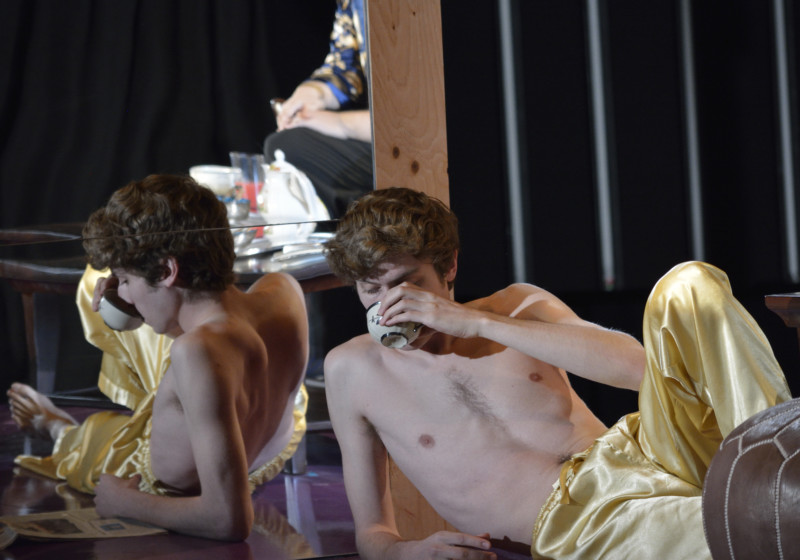“The Pinter Plays,” the UR International Theatre Program’s side-by-side productions of the late playwright Harold Pinter’s one-acts “The Collection” and “The Lover,” possessed a certain sadistic glee in their opening Thursday night. That would make me, I suppose, a happy masochist.
The sadism possessed by these plays was not a sadism exerted upon its characters (or at least not solely upon its characters), but upon the audience. The first one-act performed, “The Collection,” left me with the emotional sensation of an unreachable itch, while “The Lover” felt like a long, far too detailed, tasteless joke that you only let your friend tell you because you’re too lazy to protest.
But thanks to Pinter and the team of storytellers at URITP, I left Todd with unease in my heart and a spring in my step. The folks there have made these two plays so enveloping, with such top-notch storytelling (consistent down to the enormously impressive set and lighting design), that I didn’t care where the story was taking me, and I hardly batted an eye when a mistimed blackout onstage had to be rapidly corrected and redone.
“The Collection,” written in 1961, is about two housemates, Harry (senior Marc Laroussini) and Bill (junior Rick Carl, in his first stellar comedic performance of the night), who receive repeated calls and attempted visits from a mysterious man (a frightening, funny Joel Omino). To reveal much more would be too much, as one of this play’s finest qualities is the way it controls information.
As I said before, the play’s ultimate feeling is one of discontent, but that doesn’t mean that there’s no fun along the way. Laroussini was enjoyable to watch as Bill’s befuddled older companion, whose nastiness grows from comic to comically disturbing as his frustration grows. The suspense building is masterful in the dialogue scenes between Carl and first-year Omino, who brought a (sometimes) subtle but unshakeable menace to his every scene. Senior Meredith Watson delivered an appropriately frustrating performance, unfortunately marred by the frequent presence of an unconvincing fake cat used as a prop. (It was as distracting here as it was unfunny in “Octavia.” Todd people, I love you, but get rid of that stupid fake cat — it’s unfair to the actor who has to deal with it onstage.)
A friend of mine from high school used to talk about the differences between the weird people he didn’t like, and the weird people he did like (his friends). He told me that he was alright with the weirdos in our friend group because he always knew what they were thinking — he understood their intentions. Other weirdos, on the other hand, were total mysteries to him — he couldn’t tell what they were thinking, so they made him uncomfortable.
This was the primary source of tension in “The Collection.” (By the way, I still cannot for the life of me figure out why this play is called “The Collection.”) I was never quite sure of what each character was thinking, what they wanted, or what their goal was. The back-and-forth dialogue was fun but tense, and during the intermission I found myself on the unsettled side of things.
I actually wish that the ordering of the two plays had been reversed, because I would have liked to let the aftertaste of “The Collection” percolate a while longer afterward rather than be cut off by the next play. “The Lover,” written in 1962, follows Sarah (junior Samantha Richardson), a married woman who is allowed by her husband (Rick Carl, back again) to have her lover (Rick Carl, yet again) over when he’s not around.
This play is basically an hour-long joke, with a set-up and a punchline, but that’s okay, because the way it’s told is so damn good. Carl and Richardson delivered tour-de-force performances that made a whole lot of ridiculous things seem very real. (Have you ever heard an orgasm played on the bongos?) Richardson’s performance as Sarah was in particular so sensitive that she contributed the human element necessary for the rest of the play to function.
It is that element that brought both plays where they needed to be. Why watch an hour-long joke or put yourself through all this anxiety if you don’t care what happens to the people you’re following? One could look at the Pinter Plays and walk away with disturbing insights about the ambiguity of life. But I found myself walking away with a tangible confirmation of the power of old-fashioned, anxious, ambiguous, messed-up, human storytelling.





